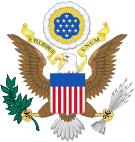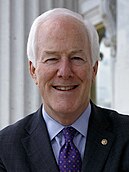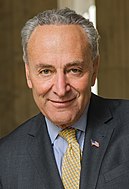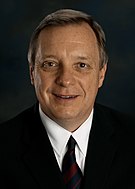Party leaders of the United States Senate
@media all and (max-width:720px).mw-parser-output .tmulti>.thumbinnerwidth:100%!important;max-width:none!important.mw-parser-output .tmulti .tsinglefloat:none!important;max-width:none!important;width:100%!important;text-align:center
Mitch McConnell (R)
John Cornyn (R)
Chuck Schumer (D)
Dick Durbin (D)
| This article is part of a series on the |
| United States Senate |
|---|
 |
History of the United States Senate |
Members |
|
Politics and procedure |
|
Places |
|
The Senate Majority and Minority Leaders are two United States Senators and members of the party leadership of the United States Senate. These leaders serve as the chief Senate spokespeople for the political parties respectively holding the majority and the minority in the United States Senate, and manage and schedule the legislative and executive business of the Senate. They are elected to their positions in the Senate by their respective party caucuses, the Senate Democratic Caucus and the Senate Republican Conference.
By rule, the Presiding Officer gives the Majority Leader priority in obtaining recognition to speak on the floor of the Senate. The Majority Leader customarily serves as the chief representative of their party in the Senate, and sometimes even in all of Congress if the House of Representatives and thus the office of Speaker of the House is controlled by the opposition party.
The Assistant Majority and Minority Leaders of the United States Senate (commonly called Senate Majority and Minority Whips) are the second-ranking members of each party's leadership. The main function of the Majority and Minority Whips is to gather votes on major issues. Because they are the second ranking members of the Senate, if there is no floor leader present, the whip may become acting floor leader. Before 1969, the official titles were Majority Whip and Minority Whip.
Contents
1 Current floor leaders
2 History
3 List of party leaders
4 See also
5 Notes
6 External links
Current floor leaders
The Senate is currently composed of 51 Republicans, 47 Democrats, and 2 independents, both of whom caucus with the Democrats.
The current leaders are long-time Senators Mitch McConnell (R) from Kentucky and Chuck Schumer (D) from New York. The current Assistant Leaders/Whips are long-time Senators John Cornyn (R) from Texas and Dick Durbin (D) from Illinois.
History
The Democrats began the practice of electing floor leaders in 1920 while they were in the minority. John W. Kern was a Democratic Senator from Indiana. While the title was not official, he is considered[by whom?] to be the first Senate party leader from 1913 through 1917 (and in turn, the first Senate Democratic Leader), while serving concurrently as Chairman of the Senate Democratic Caucus. In 1925 the majority (at the time) Republicans also adopted this language when Charles Curtis became the first (official) Majority Leader[citation needed], although his immediate predecessor Henry Cabot Lodge is considered the first (unofficial) Senate Majority Leader.
The Constitution designates the Vice President of the United States as President of the United States Senate. The Constitution also calls for a President pro tempore to serve as the leader of the body when the President of the Senate (the Vice President) is absent. In practice, neither the Vice President nor the President pro tempore—customarily the most senior (longest-serving) Senator in the majority party—actually presides over the Senate on a daily basis; that task is given to junior Senators of the majority party. Since the Vice President may be of a different party than the majority and is not a member subject to discipline, the rules of procedure of the Senate give the presiding officer very little power and none beyond the presiding role. For these reasons, it is the Majority Leader who, in practice, manages the Senate. This is in contrast to the House of Representatives where the elected Speaker of the House has a great deal of discretionary power and generally presides over votes on bills.[citation needed]
List of party leaders
The Democratic Party first selected a leader in 1920. The Republican Party first formally designated a leader in 1925.
Cong- ress | Dates | Democratic Whip | Democratic Leader | Majority | Republican Leader | Republican Whip |
|---|---|---|---|---|---|---|
63rd | May 28, 1913 – March 4, 1915 | J. Hamilton Lewis | None | Democratic ← majority | None | None |
64th | March 4, 1915 – December 6, 1915 | |||||
| December 6, 1915 – December 13, 1915 | James Wadsworth | |||||
| December 13, 1915 – March 4, 1917 | Charles Curtis | |||||
65th | March 4, 1917 – March 4, 1919 | |||||
66th | March 4, 1919 – April 27, 1920 | Peter Gerry | Republican majority → | Henry Cabot Lodge Unofficial | ||
| April 27, 1920 – March 4, 1921 | Oscar Underwood | |||||
67th | March 4, 1921 – March 4, 1923 | |||||
68th | March 4, 1923 – December 3, 1923 | |||||
| December 3, 1923 – November 9, 1924 | Joseph Taylor Robinson | |||||
| November 9, 1924 – March 4, 1925 | Charles Curtis Acting | Wesley Jones Acting | ||||
69th | March 4, 1925 – March 4, 1927 | Charles Curtis | Wesley Jones | |||
70th | March 4, 1927 – March 4, 1929 | |||||
71st | March 4, 1929 – March 4, 1931 | Morris Sheppard | James E. Watson | Simeon Fess | ||
72nd | March 4, 1931 – March 4, 1933 | |||||
73rd | March 4, 1933 – January 3, 1935 | J. Hamilton Lewis | Democratic ← majority | Charles L. McNary | Felix Hebert | |
74th | January 3, 1935 – January 3, 1937 | None[Note 1] | ||||
75th | January 3, 1937 – July 14, 1937 | |||||
| July 22, 1937 – January 3, 1939 | Alben W. Barkley | |||||
76th | January 3, 1939 – April 9, 1939 | |||||
| April 9, 1939 – January 3, 1940 | Sherman Minton | |||||
| January 3, 1940 – January 3, 1941 | Warren Austin Acting | |||||
77th | January 3, 1941 – January 3, 1943 | J. Lister Hill | Charles L. McNary | |||
78th | January 3, 1943 – February 25, 1944 | Kenneth Wherry | ||||
| February 25, 1944 – January 3, 1945 | Wallace H. White Jr. Acting | |||||
79th | January 3, 1945 – January 3, 1947 | Wallace H. White Jr. | ||||
80th | January 3, 1947 – January 3, 1949 | Scott W. Lucas | Republican majority → | |||
81st | January 3, 1949 – January 3, 1951 | Francis Myers | Scott W. Lucas | Democratic ← majority | Kenneth S. Wherry | Leverett Saltonstall |
82nd | January 3, 1951 – January 3, 1952 | Lyndon B. Johnson | Ernest McFarland | |||
| January 3, 1952 – January 3, 1953 | Styles Bridges | |||||
83rd | January 3, 1953 – July 31, 1953 | Earle Clements | Lyndon B. Johnson | Republican majority → | Robert A. Taft | |
| August 3, 1953 – January 3, 1955 | William F. Knowland | |||||
84th | January 3, 1955 – January 3, 1957 | Democratic ← majority | ||||
85th | January 3, 1957 – January 3, 1959 | Mike Mansfield | Everett Dirksen | |||
86th | January 3, 1959 – January 3, 1961 | Everett Dirksen | Thomas Kuchel | |||
87th | January 3, 1961 – January 3, 1963 | Hubert Humphrey | Mike Mansfield | |||
88th | January 3, 1963 – January 3, 1965 | |||||
89th | January 3, 1965 – January 3, 1967 | Russell B. Long | ||||
90th | January 3, 1967 – January 3, 1969 | |||||
91st | January 3, 1969 – September 7, 1969 | Ted Kennedy | Hugh Scott | |||
| September 24, 1969 – January 3, 1971 | Hugh Scott | Robert Griffin | ||||
92nd | January 3, 1971 – January 3, 1973 | Robert Byrd | ||||
93rd | January 3, 1973 – January 3, 1975 | |||||
94th | January 3, 1975 – January 3, 1977 | |||||
95th | January 3, 1977 – January 3, 1979 | Alan Cranston | Robert Byrd | Howard Baker | Ted Stevens | |
96th | January 3, 1979 – November 1, 1979 | |||||
| November 1, 1979 – March 5, 1980 | Ted Stevens Acting | |||||
| March 5, 1980 – January 3, 1981 | Howard Baker | |||||
97th | January 3, 1981 – January 3, 1983 | Republican majority → | ||||
98th | January 3, 1983 – January 3, 1985 | |||||
99th | January 3, 1985 – January 3, 1987 | Bob Dole | Alan Simpson | |||
100th | January 3, 1987 – January 3, 1989 | Democratic ← majority | ||||
101st | January 3, 1989 – January 3, 1991 | George Mitchell | ||||
102nd | January 3, 1991 – January 3, 1993 | Wendell H. Ford | ||||
103rd | January 3, 1993 – January 3, 1995 | |||||
104th | January 3, 1995 – June 12, 1996 | Tom Daschle | Republican majority → | Trent Lott | ||
| June 12, 1996 – January 3, 1997 | Trent Lott | Don Nickles | ||||
105th | January 3, 1997 – January 3, 1999 | |||||
106th | January 3, 1999 – January 3, 2001 | Harry Reid | ||||
107th | January 3, 2001 – January 20, 2001 | Democratic ← majority | ||||
| January 20, 2001 – June 6, 2001 | Republican majority → | |||||
| June 6, 2001 – November 12, 2002 | Democratic ← majority | |||||
| November 12, 2002 – January 2, 2003 | Republican majority[Note 2] → | |||||
108th | January 3, 2003 – January 3, 2005 | Republican majority → | Bill Frist | Mitch McConnell | ||
109th | January 3, 2005 – January 3, 2007 | Dick Durbin | Harry Reid | |||
110th | January 3, 2007 – December 18, 2007 | Democratic ← majority | Mitch McConnell | Trent Lott | ||
| December 19, 2007 – January 3, 2009 | Jon Kyl | |||||
111th | January 3, 2009 – January 3, 2011 | |||||
112th | January 3, 2011 – January 3, 2013 | |||||
113th | January 3, 2013 – January 3, 2015 | John Cornyn | ||||
114th | January 3, 2015 – January 3, 2017 | Republican majority → | ||||
115th | January 3, 2017 – January 3, 2019 | Chuck Schumer | ||||
116th | January 3, 2019 – January 3, 2021 | John Thune | ||||
Cong- ress | Dates | Democratic Whip | Democratic Leader | Majority | Republican Leader | Republican Whip |
See also
| This article is part of a series on the |
| Politics of the United States of America |
|---|
 |
Federal Government
|
Legislature
|
Executive
|
Judiciary
|
Elections
|
Political parties
|
Federalism
|
|
- Party leaders of the United States House of Representatives
- President pro tempore of the United States Senate
Vice President of the United States (President of the United States Senate)- Party divisions of United States Congresses
- List of political parties in the United States
Notes
^ No Republican whips were appointed from 1935 to 1944 since only 17 Republicans were in the Senate following the landslide reelection of President Franklin D. Roosevelt in 1936. Accordingly, the minutes of the Republican Conference for the period state: "On motion of Senator Hastings, duly seconded and carried, it was agreed that no Assistant Leader or Whip be elected but that the chairman be authorized to appoint Senators from time to time to assist him in taking charge of the interests of the minority." A note attached to the conference minutes added: "The chairman of the conference, Senator McNary, apparently appointed Senator Austin of Vermont as assistant leader in 1943 and 1944, until the conference adopted Rules of Organization." Source: Party Whips Archived 2010-03-09 at the Wayback Machine., via Senate.gov
^ Democrats remained in control after November 25, 2002, despite a Republican majority resulting from Jim Talent's special election victory in Missouri. There was no reorganization as the Senate was no longer in session. Party Division in the Senate, 1789–present, via Senate.gov
External links
Majority and Minority Leaders and Party Whips, via Senate.gov- Republican Majority
- Democratic Minority




